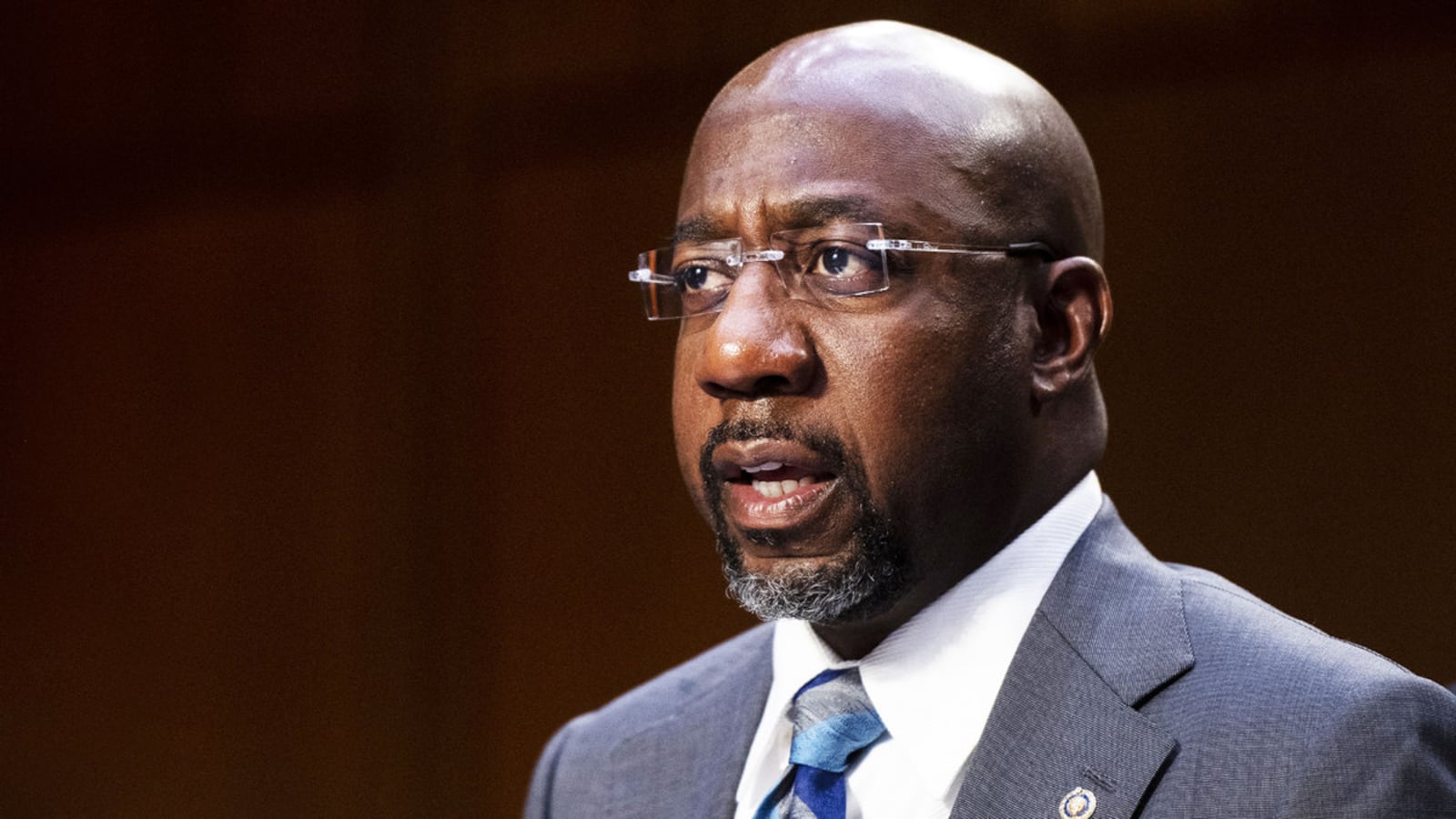The Jan. 6 attack on the Capitol changed plenty about U.S. politics, but one smaller consequence was the Federal Election Commission ruling that members of Congress could now spend campaign money on a new item: bodyguards.
While the vast majority of lawmakers haven’t yet taken the FEC up on its offer, more than two dozen did. All told, security costs have already topped $1.6 million so far this year, according to The Daily Beast’s review of recent federal disclosures.
The biggest spenders, among Democrats and Republicans, shared one attribute: they voted to impeach or convict former President Donald Trump.
Newly elected Sen. Raphael Warnock (D-GA) was far and away the leader, racking up more than $344,531 in security costs. Other members at the top of the list include Warnock’s home state colleague Sen. Jon Ossoff (D-GA), Sen. Mark Kelly (D-AZ), Rep. Eric Swalwell (D-CA), Rep. Alexandria Ocasio-Cortez (D-NY), Rep. Liz Cheney (R-WY), Sen. Mitt Romney (R-UT), and Sen. Pat Toomey (R-PA).
Only two pro-Trump officials racked up major protection expenses: Sen. Josh Hawley (R-MO) and Sen. Ted Cruz (R-TX), who had frequently charged personal security costs to his campaign even before the FEC issued its official ruling in March.
That ruling prompted a boom in campaign security spending. Although the FEC has allowed candidates and elected officials to use donor money for electronic security systems since 2017, it hadn’t said whether personal bodyguards qualified as a legitimate campaign expense. Such expenses were relatively rare, federal records show, but they exploded this year, with more than two dozen campaigns reporting personal protection costs so far in 2021.
The spike in spending reflects increased fears among elected officials after a mob of Trump supporters targeted them during the Jan. 6 attack. The largest expenses in the data, which covers the year through June 30, appear in irregular lump sums and appear to reflect responses to specific threats.
For example, Romney’s one reported expenditure—$43,633 for “security” on Feb. 11—came just ahead of his conviction vote, and one day after Matt Schlapp, chairman of the Conservative Political Action Conference, suggested that Romney’s “physical safety” would be in danger at the annual CPAC event.
“This year, I would actually be afraid for his physical safety, people are so mad at him,” Schlapp told Fox News. He later said he wished Romney no harm. “I just want him to find a new hobby away from destroying GOP momentum,” Schlapp added.
Hawley, who raised his fist outside the Capitol on Jan. 6 in solidarity with protesters, also appears to have reacted to specific perceived concerns. Two days prior, Hawley claimed a group of “Antifa scumbags” “screamed threats” and “vandalized” outside his Virginia home, a statement PolitiFact rated as “mostly false.”
His FEC filings show a combined $44,912 in two security expenses, on Jan. 12 and Jan. 25. In February, Hawley’s wife filed a criminal complaint in Fairfax County against the protest organizer, citing vandalism, trespassing, and “disrupting tranquility of the home.” A magistrate judge tossed the vandalism charge, and the first hearing is slated for Aug. 16.
A spokesperson for the Hawley campaign told The Daily Beast his wife has been threatened with “bodily harm.”
“Unfortunately, there have been numerous threats made against Senator Hawley and his wife and children, including multiple threats directly to Erin Hawley threatening bodily harm,” the spokesperson said, declining to detail examples of recent threats.
The highest costs, however, were incurred by Democrats. After Warnock, Sen. Mark Kelly (D-AZ) spent the most, paying $247,487 for personal security over the first half of 2021.
Kelly—a former Navy pilot and astronaut whose wife, former Rep. Gabrielle Giffords (R-AZ) nearly died in a 2012 assassination attempt—has never publicly mentioned specific threats, and declined to comment on security matters for this article. Ahead of the 2020 election, Kelly stood up for fellow Arizonan Rep. Paul Gosar, a Republican, who reported receiving violent threats in September.
Gosar, an election objector who “Stop the Steal” leader Ali Alexander claimed had helped to organize the Jan. 6 rally, has never reported personal protection expenses.
Behind Warnock and Kelly, two Democrats and one anti-Trump Republican round out the top five spenders—Ossoff ($162,107), Toomey ($91,059), and Swalwell ($77,661), who in early March filed a civil lawsuit against Trump and a circle of enablers, including GOP colleague Mo Brooks (R-AL).
Reached for comment, Swalwell told The Daily Beast the risk hasn’t receded since he took a leading role in Trump’s second impeachment.
“Threats to my and my family’s safety intensified dramatically when I was named an impeachment manager in January, and have not abated since,” he said.
Outspoken progressives Ocasio-Cortez and first-term Rep. Cori Bush (D-MO) also charged tens of thousands of dollars to their campaign accounts, $60,264 and $35,403, respectively. Like Cruz, Ocasio-Cortez had previously spent campaign money on protection, and specifically for events surrounding escalations in reported threats.
In prior years, these expenses were infrequent and, beyond security systems, not explicitly sanctioned. The comparatively minimal costs for those systems have been included in this analysis, which also shows that some members—such as impeachment manager Rep. Jamie Raskin (D-MD) and election objector Rep. August Pfluger (R-TX)—have installed new setups this year.
In the weeks following Jan. 6, Republican National Committee attorneys pushed regulators to formalize a rule to allow for charging security costs to campaigns. After a contentious back and forth, the FEC granted the request in March.
Notably, with the exceptions of Hawley and Cruz, the most concerned Republican officials appear to be members who voted to impeach Trump. They include Toomey, Romney, and Cheney, whose $59,300 in expenditures predates the House Republican vote this May to remove her as conference chair.
Cruz, however, presents a unique case among officials. The Texas conservative began tapping his campaign for security costs years before the FEC handed down its official ruling, racking up $71,386 between July 2018 and the end of 2020, just shy of the $74,386 he’s spent this year.
Most of Cruz’s expenses went to one firm, Atlas Glinn, who over the three months from October to December last year received a total of $46,000 from his campaign, filings show. The firm’s website showcases a photo of a security team guarding Cruz in a parade car. Outside of Atlas, Cruz’s biggest security vendor appears to be Air France, which on May 31, 2018, received two campaign payments of roughly $2,000 each, marked as “security expense.”








